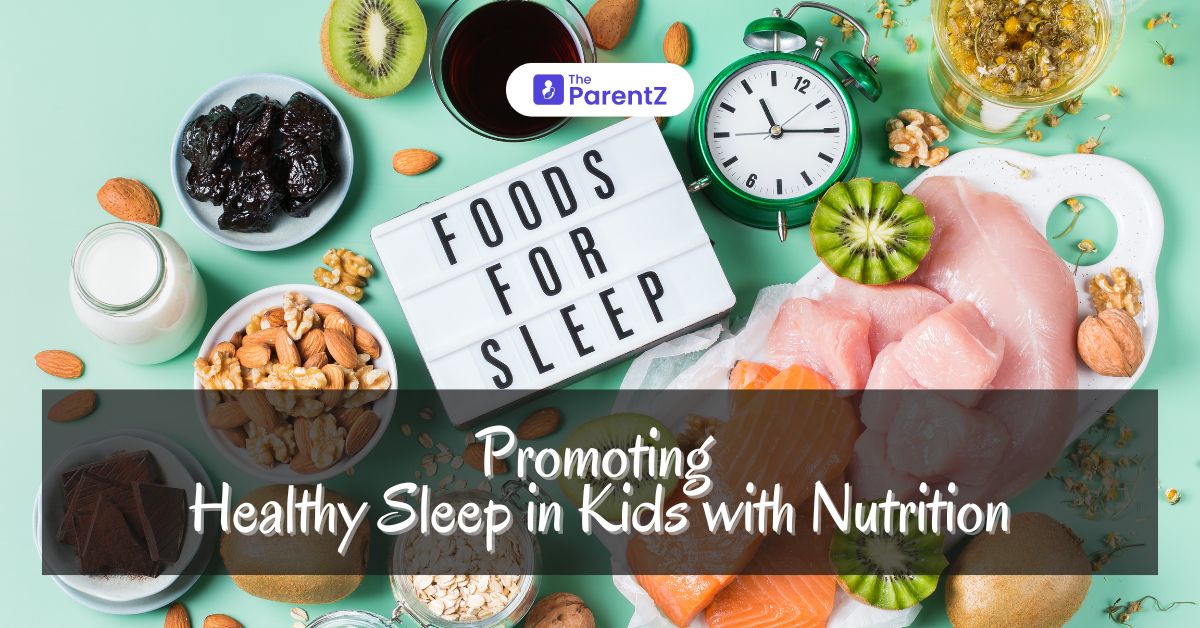In a world brimming with technological distractions, academic pressures, and busy family schedules, ensuring children get adequate and restful sleep can feel like an uphill battle. Parents often explore bedtime routines, screen time restrictions, and calming environments to improve their kids’ sleep. However, nutrition is a powerful yet frequently overlooked tool.
Imagine if the foods your child eats could naturally lull them into a serene slumber, much like a gentle lullaby.
Recent, rigorous scientific research, which forms the robust foundation of this article, is illuminating the intriguing link between what children consume and how well they sleep.
This connection is not just about avoiding caffeine or sugar before bed; it’s about comprehending how specific nutrients, as scientific studies substantiate, can synchronise the body’s internal clock, soothe the mind, and prime the body for rest.
This article deepens into sleep-promoting nutrition, offering evidence-backed insights and real-life case stories.
For instance, we’ll share the story of Geeta, a 7-year-old who struggled with sleep until her parents introduced a diet rich in sleep-promoting nutrients. Her sleep improved significantly, and she now wakes refreshed and ready for the day.
These stories highlight the transformative power of dietary changes, giving you hope and optimism about the potential improvements in your child’s sleep. We’ll also explore the essential nutrients that play pivotal roles in these children’s sleep regulation.
Real Life Case Study
Geeta, a 7-year-old girl, struggled with bedtime resistance and frequent night awakenings. Her parents reported that she consumed a diet high in sugars, with minimal fruits and vegetables.
After consulting with a qualified dietitian, they revised her diet to include more tryptophan-rich foods like bananas and dairy products. Within weeks, Sarah’s sleep patterns improved significantly. She fell asleep more easily and experienced fewer night awakenings, leading to a better mood and concentration during the day.
Amazing! How was this possible?
The Connection Between Nutrition and Sleep
Nutrition and sleep are intricately linked. Our food provides the essential building blocks for various bodily functions, including sleep regulation. Understanding how specific nutrients affect sleep can help make dietary choices that promote better rest. Rest assured, this information is not based on mere speculation but solid scientific research, which gives you confidence in the advice provided.
1. Tryptophan: The Sleep-Inducing Amino Acid
Tryptophan is an essential amino acid found in various foods. It serves as a precursor to serotonin, a neurotransmitter that helps regulate mood, and melatonin, the hormone that controls the sleep-wake cycle. High-tryptophan foods can increase the production of these critical substances, promoting a sense of calm and readiness for sleep.
- Sources: chicken, milk, cheese, yoghurt, eggs, bananas.
- Mechanism: Tryptophan crosses the blood-brain barrier and is converted into serotonin and then melatonin, facilitating sleep onset and maintenance.
2. Magnesium: The Natural Relaxant
Magnesium maintains normal muscle and nerve function, supports a healthy immune system, and regulates blood glucose levels. It is also essential for maintaining healthy levels of GABA (gamma-aminobutyric acid), a neurotransmitter that promotes relaxation and sleep.
- Sources: Leafy green vegetables (spinach, kale), nuts (almonds, cashews), seeds (pumpkin, sunflower), whole grains.
- Mechanism: Magnesium helps calm the nervous system and regulates the release of melatonin, making it easier to fall and stay asleep.
3. Calcium: The Sleep Cycle Regulator
Calcium helps the brain use tryptophan to manufacture melatonin. This mineral is crucial for maintaining a regular sleep cycle, ensuring that children can fall and stay asleep throughout the night.
- Sources: Milk, cheese, yoghurt.
- Mechanism: Calcium aids in the conversion of tryptophan into melatonin, supporting the sleep-wake cycle.
4. Vitamins B6 and B12: The Sleep Supporters
Vitamins B6 and B12 are essential for the production of serotonin and melatonin. These vitamins help regulate mood and sleep patterns, making them vital for preventing sleep disorders.
- Sources: Fish (salmon, tuna), poultry (chicken), eggs, fortified cereals.
- Mechanism: Vitamin B6 helps convert tryptophan into serotonin, while Vitamin B12 helps regulate circadian rhythms, contributing to better sleep quality.
5. Omega-3 Fatty Acids: The Stress Reducers
Omega-3 fatty acids, particularly those found in fish oil, have been shown to reduce inflammation and anxiety, which can interfere with sleep. They play a role in brain function and can help manage stress, creating a conducive environment for sleep.
- Sources: Fish (salmon, mackerel, sardines), flaxseeds, walnuts.
- Mechanism: Omega-3 fatty acids help reduce the levels of stress hormones in the body, promoting a more relaxed state conducive to sleep.
6. Limiting Sugar and Caffeine
Excessive sugar and caffeine intake can disrupt sleep patterns. Sugar can cause spikes and crashes in blood glucose levels, leading to hyperactivity and fatigue. Caffeine, a known stimulant, can interfere with the ability to fall asleep and stay asleep.
- Sources: Common in sodas, chocolates, certain teas, and energy drinks.
- Mechanism: High sugar intake can lead to energy spikes followed by crashes, disrupting the natural sleep cycle. Caffeine blocks the sleep-promoting neurotransmitter adenosine, making it harder to fall asleep.
Here’s another example of Jason, who also could experience healthy sleep with the help of nutrition
Jason, a 6-year-old boy, had difficulty falling asleep and staying asleep. His diet was high in fries, chocolates and other packaged foods.
A thorough dietary assessment led to a plan incorporating more leafy green vegetables, nuts, seeds, and whole grains while eliminating packaged foods from his diet. Over the next month, Jason’s sleep latency decreased, and he began sleeping through the night more consistently. His parents noticed a marked improvement in his energy levels and academic performance.
Conclusion
Nutrition plays a pivotal role in promoting healthy sleep in children. By incorporating tryptophan, magnesium, calcium, vitamins B6 and B12, and omega-3 fatty acids into their diets, parents can help their children achieve better sleep quality.
Case stories like those of Geeta and Jason vividly illustrate the transformative power of targeted nutritional strategies. Parents can lay the groundwork for their children’s long-term health and well-being with a focus on balanced diets and mindful eating habits, leading to more peaceful nights and energised days.








Be the first one to comment on this story.